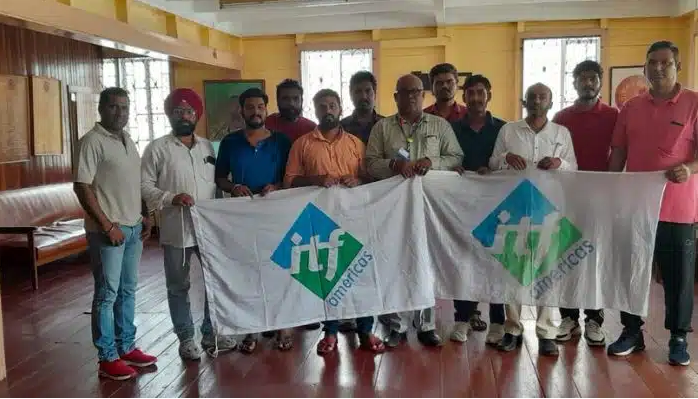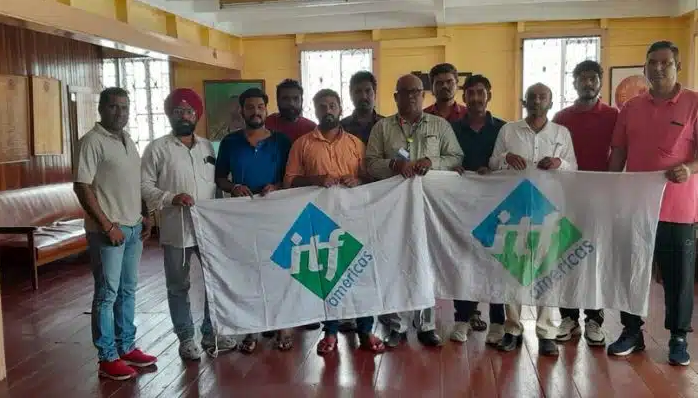12名印度海员在一艘散货船上工作了9到13个月,试图开始回家的旅程时,在南美的一个机场被拒绝。原因是:他们的老板给他们发了假机票。
根据《海事劳工公约》(MLC 2006,经修订),有时被称为“海员权利法案”,船东必须支付船员上下船的费用。
“地中海狮”号(IMO 9350331)的船员们震惊地发现,他们非但没有在3月份的长期合同结束时被遣返回国,反而被困在圭亚那——一个距离家乡近14000公里的国家。
海员们焦急地等待了六个星期,他们无法继续生活,钱也很快花光了。
在这段时间的大部分时间里,船东海狮航运公司(Sea Lion Shipping Co.)没有任何回应。
这些海员的前雇主实际上对他们形同虚传。
在他们陷入困境的几周后,其中一名船员自己掏钱买了回家的机票。
并不是所有人都能负担得起快速逃离的费用。
然而,船员们确实开始得到其他人的支持。
要求遣返他们的询问首先来自海员本人,然后是该船的船旗国圣基茨和尼维斯,然后是该船的保险公司托马斯米勒专业公司,最具影响力的是来自国际运输工人联合会(ITF)。
许多船东都知道,一旦ITF卷入案件,并动用其在全球各地港口的200多名海事工人和130名船舶检查员的力量,那些逃避对船员义务的不负责任的雇主就无处可躲了。
但对于ITF来说,这还不够。
“海狮航运公司现在必须支付船员这段时间的费用,因为他们的疏忽迫使这些海员等待公司签发真正的机票回家,”负责处理此案的ITF监察协调员Steve Trowsdale说。
他说,MLC附带的指导方针规定,船东有义务在船员签下船之日到他们回家之日之间向船员支付工资。
“不管假票最初是出于什么原因发出的,也不管公司最终是否履行了让船员回家的义务;船东对船员的其他责任仍然存在。这包括在公司没有让他们回家的整个期间全额支付他们的工资。”
海狮试图勒索海员2.4万美元的工资
提交给ITF的文件显示,海狮航运试图再次欺骗海员——这次是让他们放弃应得工资的权利,以换取回家的机会。
该公司表示,新的、真实的机票是以海员签署一份法律弃权书为条件的,该弃权书放弃了他们追讨未付工资的能力,截至他们回家时,未付工资总额超过2.4万美元。
尽管受到哄骗、企图和胁迫,海员们仍然立场坚定。他们听从了ITF的建议,要求获得遣返和拖欠工资的权利。
公司屈服了,船员们回到了印度的家中,并保留了他们的权利。在ITF的帮助下,他们正在向该公司索赔。
ITF的Steve Trowsdale表示,该行业应该避开Sea Lion,因为该公司“首先让船员们在没有任何消息的情况下消沉了数周,这已经够糟糕的了。然后试图迫使这些绝望的人在他们需要的钱和与家人团聚之间做出选择——这是残忍的,很可能是非法的。”
“海狮航运公司继续对这些海员采取不光彩的行为。他们显然没有吸取教训。因此,ITF和行业必须教会他们一点:海事部门对欺诈和欺凌行为是零容忍的。”
圣基茨和不完善的方便旗系统的问题
Trowsdale表示,ITF将向该船的船旗国(该船的注册国)报告此案。
联合会将要求圣基茨和尼维斯调查船东,并确定是否有违反国旗规定的行为。如果发现违规,海狮航运公司应该被禁止注册圣基茨和尼维斯以及任何其他旗帜的船只。
Trowsdale还将对圣基茨和尼维斯的潜在违规行为进行追责。
作为负责确保《海事劳工公约》在其船舶上得到遵守的监管机构,圣基茨和尼维斯本应查明有5名船员在其6个月合同结束后仍在Med海狮号上工作,这是《海事劳工公约》所不允许的情况。
也许最严重的是,其中一名船员在出现机票问题时,已经在船上待了13个月,这显然违反了公约规定的最多一年的规定。
身体和心理上的疲劳随着船上时间的延长而增加,已被证明是造成海上事故和船上受伤人数增加的一个因素。
他说,由于未能解决这一问题,船旗国危及船员、过往船只上人员的生命和海洋环境。
“这只是方便旗系统让船员失望的最新例子。”
 ▲Crew from the Med Sea Lion are thankful for ITF support after they found their employer had provided them with fake tickets home after months at sea (Credit: ITF)
▲Crew from the Med Sea Lion are thankful for ITF support after they found their employer had provided them with fake tickets home after months at sea (Credit: ITF)
英文原文
Twelve Indian seafarers were turned away at a South American airport as they tried to begin their journey home after working on board a bulk carrier for between nine and 13 months. The reason: their boss had issued them fake flight tickets.
Under the Maritime Labour Convention (MLC 2006, as amended), sometimes called ‘the Seafarers’ Bill of Rights’, a shipowner is required to cover the costs of getting crew to and from their vessel.
The crew of the Med Sea Lion (IMO 9350331) were understandably shocked, then, to discover that instead of being repatriated home at the end of their long contracts in March, they were effectively stuck in Guyana – a country nearly 14,000 km from home.
For six weeks the seafarers waited anxiously, unable to get on with their lives and fast running out of money.
For most of that time, there was no response from the ship’s owners, Sea Lion Shipping Co. The seafarers’ former employer effectively ghosted them. A few weeks into their plight, one of the crew paid for his own ticket home. Not all could afford a quick escape.
However, the crew did start to receive support from others. Enquiries demanding their repatriation were issued, first from the seafarers themselves and then by the ship’s flag State, St Kitts and Nevis, and then by the vessel’s insurer Thomas Miller Speciality, and most impactfully – from the International Transport Workers’ Federation (ITF).
Many shipowners know that once the ITF becomes involved in a case, and brings the strength of its more than 200 maritime workers’ 130 ship inspectors at ports dotted around the globe, there can be nowhere to hide for irresponsible employers who shirk their obligations to crew.
Sea Lion Shipping was forced to repatriate the remaining 11 seafarers to India at the end of April.
But for the ITF, that’s not enough. Not anymore.
“Sea Lion Shipping Co now has to pay the crew for the period where their negligence forced these seafarers to wait around for the company to issue real flight tickets home,” said Steve Trowsdale, the ITF’s Inspectorate Coordinator who has been handling the case.
He said the guidelines accompanying the MLC placed an obligation on shipowners to pay crew’s wages between the day they sign off a vessel and the day they get home.
“Whatever the reason the fake tickets were issued in the first place, and regardless of the fact the company was made to honour their obligations to get the crew home in the end; the shipowner’s other responsibilities to crew remain. This includes to pay them in full for the entire period that the company didn’t get them home,” Trowsdale said.
Sea Lion tried to bully seafarers out of $24,000 wages
Documents given to the ITF can now reveal that Sea Lion Shipping tried to trick the seafarers again – this time into waiving their rights to wages they were due, in exchange for passage home.
The company said fresh, real tickets were conditional on the seafarers signing a legal waiver letter giving up their ability to pursue the outstanding wages, which totalled more than USD $24,000 by the time they went home.
Despite the cajoling and attempts and coercion, the seafarers stood firm. They heeded the advice of the ITF, demanding their rights – both to repatriation and to wages they were owed.
The company caved, and the crew are back home in India with their rights reserved. They are pursuing, with the help of the ITF, claims against the company for the money.
The ITF’s Steve Trowsdale said the industry should shun Sea Lion, after the company “First left the crew to rot for weeks without even word, which is bad enough. But then to try to force these desperate people to choose between the money they need or seeing their families again – that is cruel and likely illegal.”
“Sea Lion Shipping Co continues to behave disgracefully towards these seafarers. They clearly haven’t learnt their lesson. So the ITF and the industry must teach them one: that there is zero tolerance for frauds and bullies in the maritime sector.”
Questions for St Kitts and broken Flags of Convenience system
Trowsdale said the ITF would be writing about the case to the ship’s flag State, the country where it is registered to.
The federation will ask Saint Kitts and Nevis to investigate the shipowner and determine any breaches of the flag’s rules. If found in breach, Sea Lion Shipping Co should be barred from registering vessels to Saint Kitts and Nevis and any other flag.
Trowsdale will also be taking Saint Kitts and Nevis to task for a potential violation of its own.
As the regulator charged with ensuring the Maritime Labour Convention is adhered to aboard its ships, Saint Kitts and Nevis should have identified that five of the crew had working onboard the Med Sea Lion well past the end of their six-month contracts, a situation that is not allowed under the MLC.
Perhaps most seriously, one of the crew had been onboard for a total of 13 months at the time of the ticket debacle – a clear breach of the Convention’s one year maximum.
Tiredness and fatigue, which increase with extended periods onboard, had been proven as a contributing factor in marine accidents and increased injuries onboard.
By failing to address the situation, the flag State had endangered the lives of crew, those aboard passing ships, and the marine environment, he said.
“This is just the latest example of where the Flags of Convenience system has let down crew.”
免责申明:本文来自MI News Network,如有误差,以英文为准;仅代表作者观点,不代表中国海员之家立场。其真实性及原创性未能得到中国海员之家证实,在此感谢原作者的辛苦创作,如转载涉及版权等问题,请作者与我们联系,我们将在第一时间处理,谢谢!联系邮箱:cnisu@54seaman.com

 联系我们人工客服
联系我们人工客服



















 :1391995811
:1391995811


评论 (0人参与)